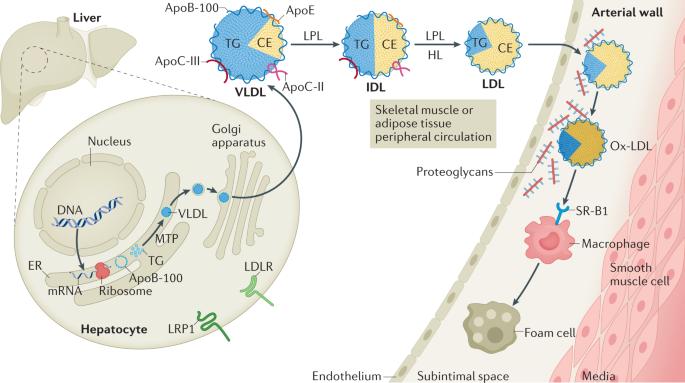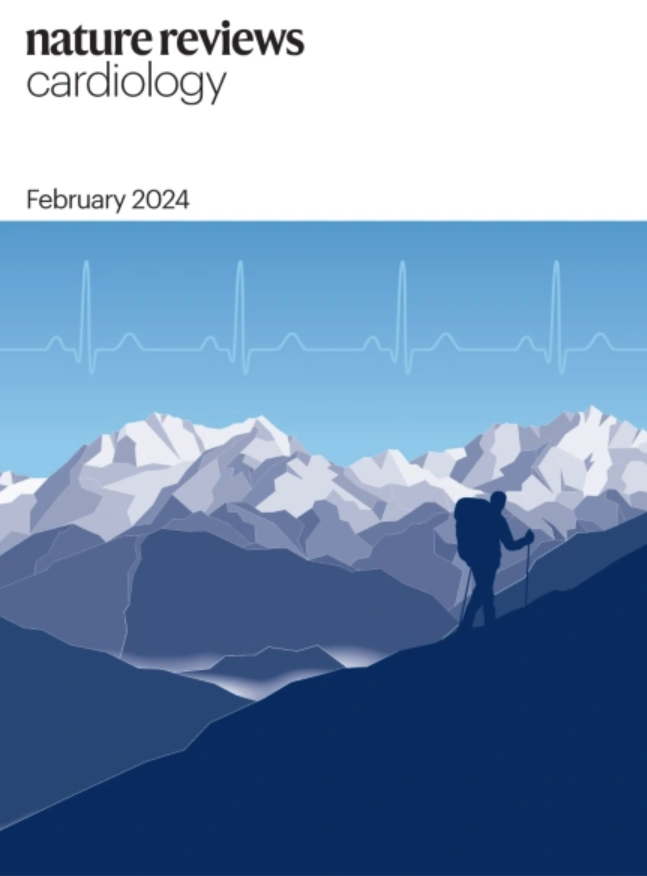Apolipoproteins in vascular biology and atherosclerotic disease
IF 41.7
1区 医学
Q1 CARDIAC & CARDIOVASCULAR SYSTEMS
引用次数: 58
Abstract
Apolipoproteins are important structural components of plasma lipoproteins that influence vascular biology and atherosclerotic disease pathophysiology by regulating lipoprotein metabolism. Clinically important apolipoproteins related to lipid metabolism and atherogenesis include apolipoprotein B-100, apolipoprotein B-48, apolipoprotein A-I, apolipoprotein C-II, apolipoprotein C-III, apolipoprotein E and apolipoprotein(a). Apolipoprotein B-100 is the major structural component of VLDL, IDL, LDL and lipoprotein(a). Apolipoprotein B-48 is a truncated isoform of apolipoprotein B-100 that forms the backbone of chylomicrons. Apolipoprotein A-I provides the scaffolding for lipidation of HDL and has an important role in reverse cholesterol transport. Apolipoproteins C-II, apolipoprotein C-III and apolipoprotein E are involved in triglyceride-rich lipoprotein metabolism. Apolipoprotein(a) covalently binds to apolipoprotein B-100 to form lipoprotein(a). In this Review, we discuss the mechanisms by which these apolipoproteins regulate lipoprotein metabolism and thereby influence vascular biology and atherosclerotic disease. Advances in the understanding of apolipoprotein biology and their translation into therapeutic agents to reduce the risk of cardiovascular disease are also highlighted. In this Review, Mehta and Shapiro discuss the mechanisms by which apolipoproteins regulate lipoprotein metabolism and thereby influence vascular biology and atherosclerotic disease. Advances in the understanding of apolipoprotein biology and their translation into therapeutic agents to reduce the risk of cardiovascular disease are also highlighted.

血管生物学和动脉粥样硬化疾病中的载脂蛋白
载脂蛋白是血浆脂蛋白的重要结构成分,通过调节脂蛋白代谢影响血管生物学和动脉粥样硬化疾病的病理生理学。临床上与脂质代谢和动脉粥样硬化相关的重要载脂蛋白包括载脂蛋白 B-100、载脂蛋白 B-48、载脂蛋白 A-I、载脂蛋白 C-II、载脂蛋白 C-III、载脂蛋白 E 和载脂蛋白(a)。载脂蛋白 B-100 是 VLDL、IDL、LDL 和脂蛋白(a)的主要结构成分。载脂蛋白 B-48 是载脂蛋白 B-100 的截短异构体,构成乳糜微粒的骨架。载脂蛋白 A-I 为高密度脂蛋白的脂化提供支架,并在胆固醇逆向运输中发挥重要作用。载脂蛋白 C-II、载脂蛋白 C-III 和载脂蛋白 E 参与富含甘油三酯的脂蛋白代谢。载脂蛋白(a)与载脂蛋白 B-100 共价结合形成脂蛋白(a)。在本综述中,我们将讨论这些载脂蛋白调节脂蛋白代谢从而影响血管生物学和动脉粥样硬化疾病的机制。本综述还重点介绍了在了解脂蛋白生物学方面取得的进展,以及将这些进展转化为降低心血管疾病风险的治疗药物。在这篇综述中,Mehta 和 Shapiro 讨论了脂蛋白调节脂蛋白代谢从而影响血管生物学和动脉粥样硬化疾病的机制。此外,还重点介绍了对脂蛋白生物学认识的进展,以及将其转化为降低心血管疾病风险的治疗药物的进展。
本文章由计算机程序翻译,如有差异,请以英文原文为准。
求助全文
约1分钟内获得全文
求助全文
来源期刊

Nature Reviews Cardiology
医学-心血管系统
CiteScore
53.10
自引率
0.60%
发文量
143
审稿时长
6-12 weeks
期刊介绍:
Nature Reviews Cardiology aims to be the go-to source for reviews and commentaries in the scientific and clinical communities it serves. Focused on providing authoritative and accessible articles enriched with clear figures and tables, the journal strives to offer unparalleled service to authors, referees, and readers, maximizing the usefulness and impact of each publication. It covers a broad range of content types, including Research Highlights, Comments, News & Views, Reviews, Consensus Statements, and Perspectives, catering to practising cardiologists and cardiovascular research scientists. Authored by renowned clinicians, academics, and researchers, the content targets readers in the biological and medical sciences, ensuring accessibility across various disciplines. In-depth Reviews offer up-to-date information, while Consensus Statements provide evidence-based recommendations. Perspectives and News & Views present topical discussions and opinions, and the Research Highlights section filters primary research from cardiovascular and general medical journals. As part of the Nature Reviews portfolio, Nature Reviews Cardiology maintains high standards and a wide reach.
 求助内容:
求助内容: 应助结果提醒方式:
应助结果提醒方式:


